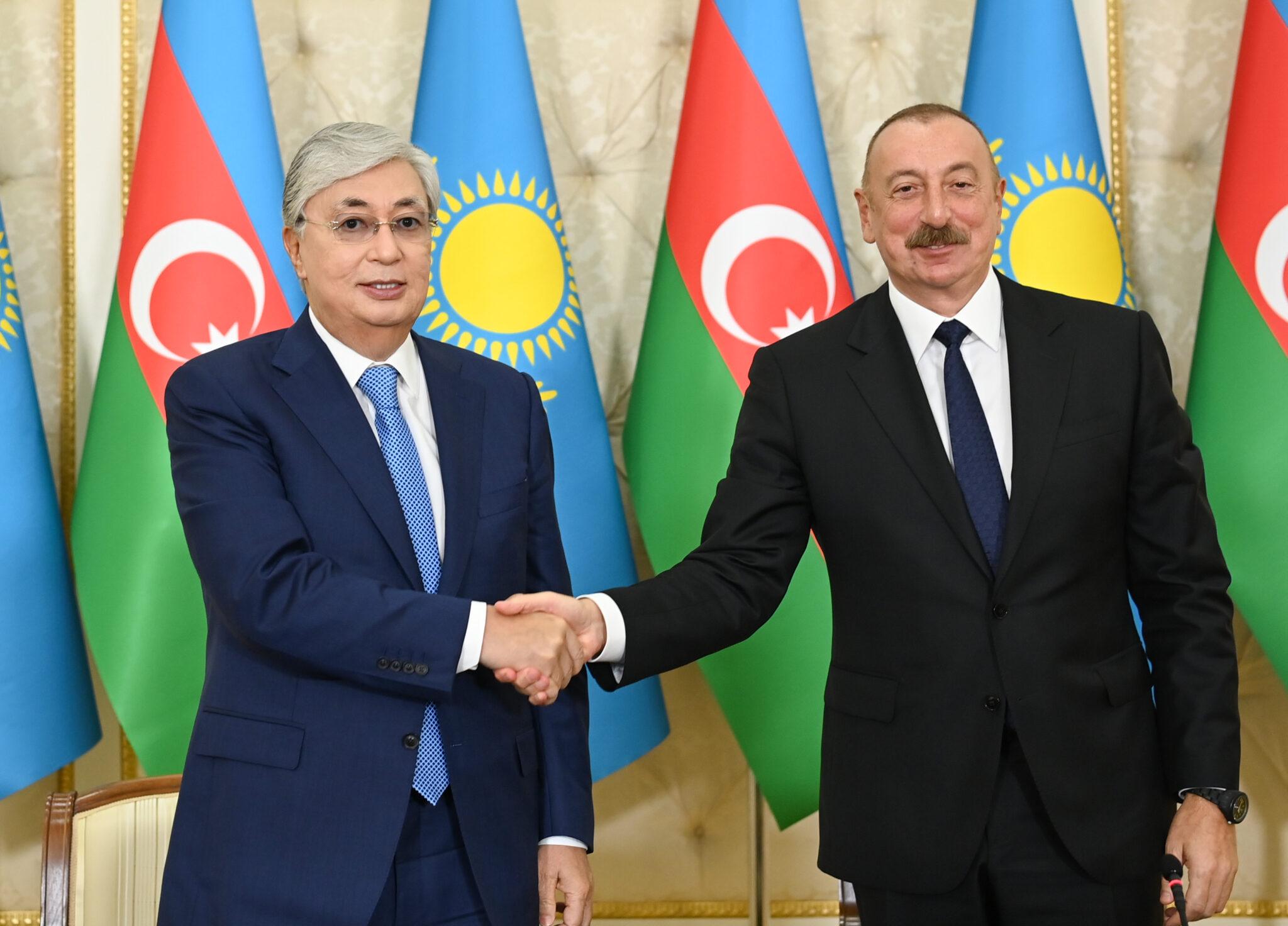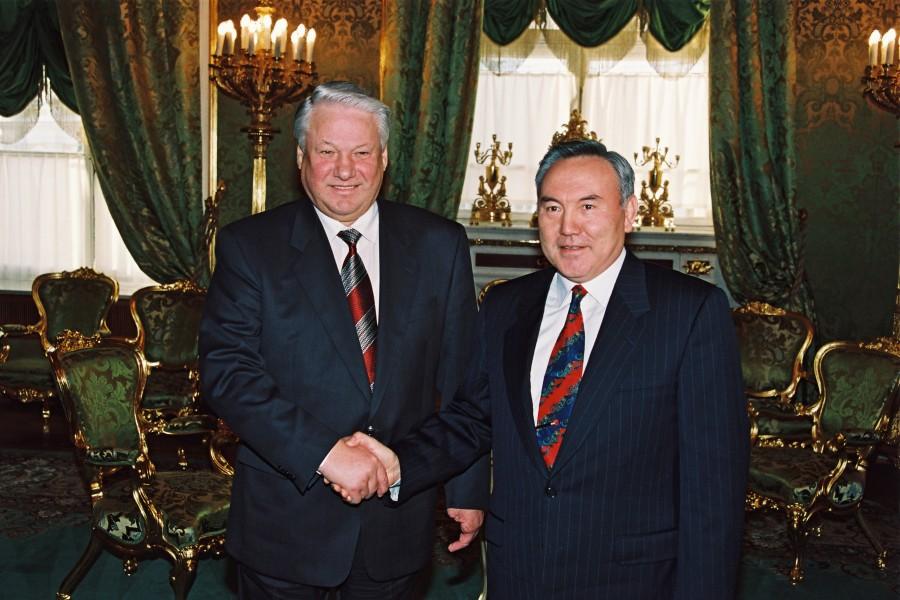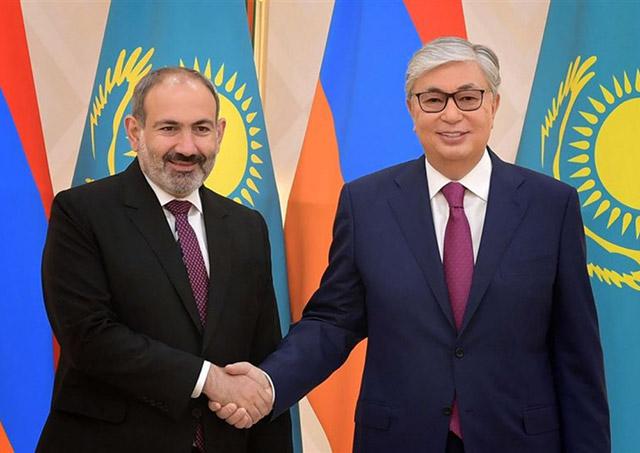Scene-Setter: Kazakhstan's diplomatic stage for Azerbaijani-Armenian peace talks
ANALYTICS 06 May 2024 - 09:14
| Fuad Muxtar-Agbabali |
The upcoming talks between the foreign ministers of Azerbaijan and Armenia, scheduled to be held in Almaty, Kazakhstan, mark a significant development in the ongoing efforts to advance a regional peace treaty. This initiative, orchestrated by President Kasym-Jomart Tokayev following his official visits to Baku and Yerevan, underscores Kazakhstan's emerging role as a pivotal actor in conflict resolution within the post-Soviet space.
The decision to convene the talks in Almaty highlights Kazakhstan's commitment to providing a neutral and conducive environment for diplomatic discussions. Unlike other prominent actors like Moscow, Brussels, and Washington, Kazakhstan positions itself as a non-partisan host, refraining from active mediation while facilitating dialogue between Baku and Yerevan.

This approach signifies Yerevan's acceptance of Baku's proposal, initially put forth in autumn of the preceding year, for a peace dialogue hosted in a neutral state with cordial relations with both parties. Kazakhstan's historical engagement in supporting peace dialogues, evidenced by the 1991 Zheleznovodsk agreement, mediated by then-Russian President Boris Yeltsin and Kazakh President Nursultan Nazarbayev between Baku and Yerevan, further legitimizes its role in fostering regional stability.
Pundits in comments on relations between Azerbaijan and Armenia view Kazakhstan's recent peace initiative positively, recognizing it as a testament to Astana's growing influence and centrality in global and regional affairs, underscoring its ascent as a prominent actor in the post-Soviet landscape, with Tokayev's initiative underscoring the nation's commitment to crisis resolution.
The timing of Kazakhstan's increased engagement in peace efforts coincides with a broader trend of the nation’s rising influence over the past few years. This is exemplified by initiatives such as the Astana format, which underscores Kazakhstan's longstanding commitment to regional stability within the post-Soviet realm.

Kazakhstan's involvement in the Armenian-Azerbaijani conflict is pivotal in breaking the negotiations' deadlock. It is expected to be attributed to the prolonged impasse in the absence of a trusted mediator. Unlike European or Moscow-based platforms, this Central Asian nation offers a balanced compromise, maintaining cordial relations with Russia, China, and Western nations alike.
Objectives of Kazakhstan’s proposal
The Tokayev government's interests in promoting a peaceful settlement in the South Caucasus are twofold.
First, the realization of trade routes through the Zangazur corridor holds significant economic promise. Second, Kazakhstan's international stature stands to benefit from successful conflict resolution efforts, bolstering its global reputation.
Armenia perceives the transition to direct negotiations and the selection of Almaty as a diplomatic triumph for Azerbaijan and some Armenian experts believe that Azerbaijan, under President Ilham Aliyev's leadership, has skillfully sidelined external mediators to engage Armenia directly in peace talks.
The transfer to direct negotiations poses challenges for Armenia, particularly amid regional imbalances heightened by tensions in Tavush region. Kazakhstan's role as a neutral host, providing a venue for discussions, signifies a departure from traditional mediation formats and underscores Armenia's diminished bargaining power.
Armenian experts also caution that Kazakhstan's interests, specifically its ambitions concerning the Zangazur Corridor and the Middle Corridor project, could influence the negotiation process. The potential for Kazakhstan to advocate for the Zangazur Corridor through Zangazur (Syunik) highlights the multifaceted geopolitical considerations at play.
The upcoming meeting, slated to occur against the backdrop of Kazakhstan's amicable and strategic relations with both countries, signifies a milestone in Kazakhstan's foreign policy narrative. Tokayev's recent state visits to Azerbaijan and Armenia have laid the groundwork for this crucial dialogue, emphasizing Kazakhstan's proactive role in fostering peace and reconciliation.
The timing of the talks is particularly significant, coming on the heels of the definitive resolution of the protracted conflict between Azerbaijan and Armenia. With hostilities officially ceasing and Nagorno-Karabakh reintegrated under Azerbaijani jurisdiction, a new chapter of cooperation beckons. The commitment to delimiting the state border further underlines the earnest efforts towards lasting peace - a terrain ripe for Kazakhstan's mediation.
Kazakhstan's involvement transcends traditional mediation. It now assumes the role of a dialogue platform moderator - a testament to its diplomatic dexterity and growing influence on the world stage. This transition mirrors Kazakhstan's earlier initiatives, notably the Astana process aimed at resolving the Syrian conflict, which showcases its capability to orchestrate complex negotiations effectively.

The motivations behind Kazakhstan's deepening involvement are multifaceted. Beyond advancing regional peace, Kazakhstan seeks to enhance its peacekeeping credentials, bolstering credibility in its foreign policy engagements. The participation in Karabakh's settlement signals broader ambitions, resonating positively with partners like Russia and Ukraine, to whom Kazakhstan has extended mediation services.
The choice of Almaty as the negotiation venue carries symbolic weight. As the birthplace of the Commonwealth of Independent States (CIS), formed during a historic summit in 1991, Almaty embodies the spirit of collaborative diplomacy. The alignment with the 1991 Almaty Declaration for border delimitation underscores Kazakhstan's diplomatic finesse within the CIS framework.
Moreover, Kazakhstan's aspiration to elevate Almaty as a global dialogue hub gains traction through hosting high-stakes negotiations. With a precedent of successfully mediating international disputes, such as the Iran nuclear talks, Almaty emerges as a formidable contender for Brussels' status in facilitating peace dialogues.
The preference for Almaty over other potential venues reflects strategic alignments. Azerbaijan's pivot away from European mediation, viewing it as pro-Armenian, aligns with Kazakhstan's chairmanship of the Organisation of Turkic States, underscoring shared regional interests and mutual support.
Conclusion
As the stage is set in Almaty, the city assumes a pivotal role in shaping the narrative of Azerbaijani-Armenian relations. Against a backdrop of diplomatic finesse and historical resonance, Kazakhstan navigates the path towards enduring peace - a testament to its commitment to regional stability and global harmony.
Kazakhstan's role in hosting the forthcoming talks between Azerbaijan and Armenia reflects its evolving status as a peace-brokering nation in Central Asia. While Kazakhstan refrains from active mediation, its neutrality and geopolitical positioning make it a crucial facilitator in fostering dialogue between the two conflicting parties.
For Azerbaijan, the shift to direct negotiations without external mediators represents a diplomatic victory. Despite Kazakhstan's non-mediation stance, it could play a supportive role if needed during negotiations.
However, concerns persist in Armenia about Kazakhstan's broader strategic interests, particularly related to the Zangazur corridor and trade routes.
Caliber.Az
|
1
|
700 tunnel shafts found in Rafah, 50 cross into Egypt Israel informs South Africa at UN top court
17 May 2024 - 15:56
|
|
2
|
Uncertainty over Russian border guard withdrawal from Armenia Amid conflicting statements
18 May 2024 - 14:47
|
|
3
|
New Caledonia crisis mirrors Macron's hypocrisy on Azerbaijan France faces its own crisis
17 May 2024 - 17:20
|
|
4
|
France's coercive colonial policies in New Caledonia Hypocrisy, repression, struggle for self-determination
16 May 2024 - 17:29
|
|
5
|
Political unrest in Armenia & Georgia amid Azerbaijan's rebuilding efforts in Karabakh South Caucasus in flux
16 May 2024 - 17:18
|
Construction of Turkish Akkuyu Nuclear Power Plant nears completion, director says
19 May 2024 - 12:21
Israel, Hamas suspend prisoner swap talks
19 May 2024 - 11:52
German chancellor warns against full-scale ground operation in Rafah
19 May 2024 - 11:23
China uncovers "multiple espionage cases" in space sector
19 May 2024 - 10:54
Latvian Parliament speaker pays official visit to Azerbaijan
19 May 2024 - 10:25
President Aliyev inaugurates “Zangilan” and “Shayifli” hydroelectric power plants
PHOTO19 May 2024 - 09:56
President’s aide discusses Azerbaijani-American partnership at US Institute of Peace
PHOTO19 May 2024 - 09:27
Germany's Bundesrat passes gender self-identification law
19 May 2024 - 09:00
Poland to spend over 2.3 bln euros to fortify eastern border
PM says19 May 2024 - 06:30
Kim's sister denies North Korea has supplied weapons to Russia
19 May 2024 - 04:23
Iran hangs two women as surge in executions intensifies: NGO
19 May 2024 - 02:20
US Army’s multidomain task force contributing to AUKUS
19 May 2024 - 00:15
Slovakia at pivotal moment after Robert Fico shooting
18 May 2024 - 22:10
Russia admits it can’t halt nighttime uncrewed surface vessel raids
18 May 2024 - 20:00
Palestinian resistance eliminates 15 Israeli soldiers in Rafah
18 May 2024 - 18:18
Slovak PM’s attacker pleads guilty before court — media
18 May 2024 - 18:08
White House not thrilled by Macron’s D-Day invite to Russia
18 May 2024 - 17:59
Poland to begin construction of Eastern Shield
18 May 2024 - 17:47
Resistance destroys 100 Israeli vehicles in 10 days
18 May 2024 - 17:32
Hungarian FM calls for Azerbaijani delegation's return to PACE
18 May 2024 - 17:17
Ambrey says Panama-flagged oil tanker attacked southwest of Yemen's Mokha
18 May 2024 - 17:02
Pakistan, India issue warnings to students in Kyrgyzstan after mob violence
18 May 2024 - 16:47
New Croatian government receives confidence vote in Zagreb assembly
18 May 2024 - 16:36
Presidential couple attend inauguration, groundbreaking ceremonies in de-occupied territories
18 May 2024 - 16:30
Zelenskyy expects Russia to intensify offensive in northeast Ukraine
18 May 2024 - 16:24
Azerbaijan participates in 79th CISM General Assembly and Congress
18 May 2024 - 16:12
White House: “No surprise” over strengthening Russia-China alliance
18 May 2024 - 16:00
Five activists from Yerevan's revanchist movement released after detention
18 May 2024 - 15:47
China probes agriculture minister for suspected disciplinary violations
18 May 2024 - 15:36
Azerbaijani marine special forces involved in military exercises in Türkiye
PHOTO18 May 2024 - 15:24
German lawmakers suggest allies could protect sky over western Ukraine from NATO soil
18 May 2024 - 15:12
French authorities report sixth fatality in New Caledonia violence
18 May 2024 - 14:59
Uncertainty over Russian border guard withdrawal from Armenia
Amid conflicting statements18 May 2024 - 14:47
Azerbaijan, Iran set to inaugurate Qiz Qalasi hydroelectric complex on Araz River
18 May 2024 - 14:35
Future of nuclear energy: balancing clean power, safety, innovation
Caliber.Az on YouTube18 May 2024 - 14:23
Australia applies sanctions for North Korea arms supply
18 May 2024 - 14:08
US: 30 years for man who attacked Nancy Pelosi's husband
18 May 2024 - 13:53
Azerbaijani gas supplies to Europe via TAP surpass 35 billion cubic meters
18 May 2024 - 13:40
US says drone strikes on Russia hurt fuel supplies but not power
18 May 2024 - 13:28
COP29 at crossroads in Azerbaijan with focus on climate finance
Article by The Guardian18 May 2024 - 13:17
